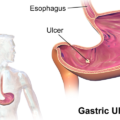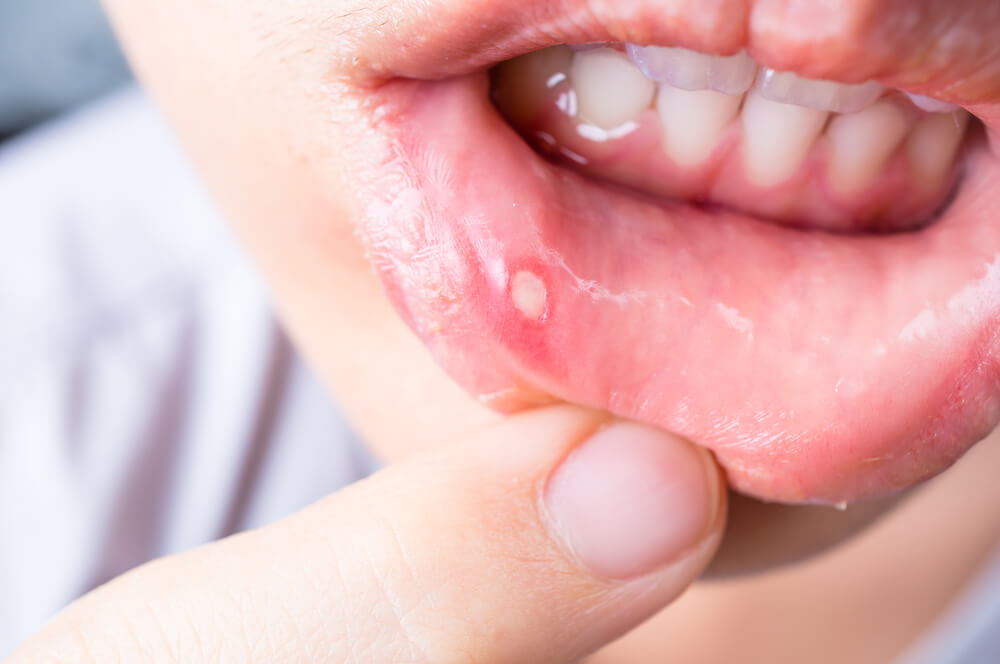Stomach ulcers, Ulcer symptoms, Gastric ulcers, Duodenal ulcers, Peptic ulcers, Peptic ulcer disease, Gastric ulcer, Bleeding ulcer.
Root Cause of Disease
Stomach ulcers are open sores that develop on the inside lining of your stomach and the upper portion of your small intestine. Gastric ulcers are the peptic ulcers that occur on the inside of the stomach.
Symptoms
Symptoms of gastric and duodenal ulcers are generally similar. The most common complaint is a burning pain in the stomach.
- Burning stomach pain
- Feeling of fullness, bloating or belching
- Intolerance to fatty foods
- Heartburn
- Nausea
The most common peptic ulcer symptom is burning stomach pain. Stomach acid makes the pain worse, as does having an empty stomach. The pain can often be relieved by eating certain foods that buffer stomach acid or by taking an acid-reducing medication, but then it may come back. The pain may be worse between meals and at night. Less common and more severe symptoms include:
- Feeling lightheaded
- Weight loss
- Blood in the stool
- Vomiting
- Vomiting blood
- Trouble breathing
Causes
Peptic ulcers result from damage or erosion to the protective lining of the digestive tract.
Common causes include:
A bacterium. Helicobacter pylori bacteria commonly live in the mucous layer that covers and protects tissues that line the stomach and small intestine. Often, the H. pylori bacterium causes no problems, but it can cause inflammation of the stomach’s inner layer, producing an ulcer.
It’s not clear how H. pylori infection spreads. It may be transmitted from person to person by close contact, such as kissing. People may also contract H. pylori through food and water.
Regular use of certain pain relievers. Taking aspirin, as well as certain over-the-counter and prescription pain medications called nonsteroidal anti-inflammatory drugs (NSAIDs) , can irritate or inflame the lining of your stomach and small intestine. These medications include ibuprofen (Advil, Motrin IB, others), naproxen sodium (Aleve, Anaprox DS, others), ketoprofen and others. They do not include acetaminophen (Tylenol, others).
Other medications. Taking certain other medications along with NSAIDs, such as steroids, anticoagulants, low-dose aspirin, selective serotonin reuptake inhibitors (SSRIs), alendronate (Fosamax) and risedronate (Actonel), can greatly increase the chance of developing ulcers.
Home Remedies to treat Gastric Ulcers
Remedy – 1: Probiotics

Probiotics are living organisms that help restore balance to the bacteria in the digestive tract. As well as helping achieve optimal gut health, they can help with treating ulcers.Probiotics cannot kill H. pylori bacteria. However, they may reduce the amount of bacteria present, speed up the healing process, and improve some symptoms.
When taken alongside other treatments, probiotics may help eradicate harmful bacteria.
People can find probiotics in the following sources:
- Yogurts
- Fermented foods
- Probiotic supplements
Some foods have probiotics in them. But, consider taking supplements as they have higher concentrations of probiotics per serving.
Remedy – 2: Colorful Fruits

Many fruits contain compounds called flavonoids, which are polyphenols. Flavonoids contribute tothe rich colors of some fruits.
polyphenols can help with stomach ulcers. They can also help a range of other digestive issues, including spasms and diarrhea. Flavonoids protect the stomach lining from developing ulcers. They do this by increasing stomach mucus, which inhibits the growth of H. pylori. Flavonoids also have antioxidant properties.
Flavonoids are present in fruits such as:
Remedy – 3: Honey

Honey is a popular, natural sweetener used across the United States. People who consume honey regularly can enjoy a range of health benefits.
A review from 2016 states that Manuka honey has antimicrobial effects against H. pylori. It suggests that honey could be useful for treating stomach ulcers.
People also use honey to speed up wound healing, including skin ulcers, burns, and wounds.
Product link: Honey
Other Remedies
Cayenne pepper
This natural cure is very effective for the treatment of peptic ulcer. Cayenne pepper has a compound known as capsaicin which can inhibit the secretion of stomach acids, stimulates mucus secretions and gastric mucosal blood flow and boost the production of alkali which can help in the prevention and healing of peptic ulcers. You should mix 1/8 teaspoon of cayenne pepper in one glass of warm water. You should drink it 2 times per day in a period of 2 – 3 days. You should gradually increase the amount of cayenne pepper to ¼ teaspoon two times per day in a period of one week. Also you can take cayenne capsules but you need to talk with your doctor about the correct dosage. Also you can add a pinch of cayenne pepper to meats, soups and other savory dishes.
Banana
Both ripe and unripe bananas are very effective home remedies for the treatment of peptic ulcers. Bananas have some antibacterial compounds which can inhibit the growth of ulcer – causing H. pylori. This natural cure can protect the system by wiping out the acidity of gastric juices. It can help to reduce the inflammation and also it will strengthen the stomach lining. You should eat at least 3 ripe bananas on a daily basis as your natural treatment for peptic ulcer. If you do not want to eat bananas, then you can make a banana milkshake. There is another option and that is to peel 2 or 3 bananas and cut them into thin slices. You should put these slices in the sun until they become dry. You should grind the dried banana pieces into a fine powder. You should mix together 2 tablespoons of this powder and 1 tablespoon of honey. You should consume this mixture 3 times a day in a period of one week.
Cabbage
Cabbage is one of the best home remedies for peptic ulcers. It is a lactic acid food which can help to produce the amino acid which is stimulating the blood flow to the stomach lining. This can help to strengthen the stomach lining and heal the peptic ulcer. Also cabbage has a good amount of Vitamin C which can be very beneficial for people who suffer from H. pylori infections. There are some experiments in which it is shown that the fresh carrot juice has anti – peptic ulcer factor – Vitamin U. You should cut one half of a raw head of cabbage and 2 carrots into small pieces. You should put these pieces in a blender to extract the juice. You should drink ½ cup of this juice before each meal and when you go to bed. You should repeat this natural treatment on a daily basis for a period of a few weeks. You should drink the fresh juice each time.
Preventions
- Avoid tobacco products
- Avoid alcohol
- Use caution with aspirin and/or NSAIDs
- Don’t ignore your ulcer symptoms
- Protect yourself from infections by washing hands regularly and consuming foods that have been cooked thoroughly.




